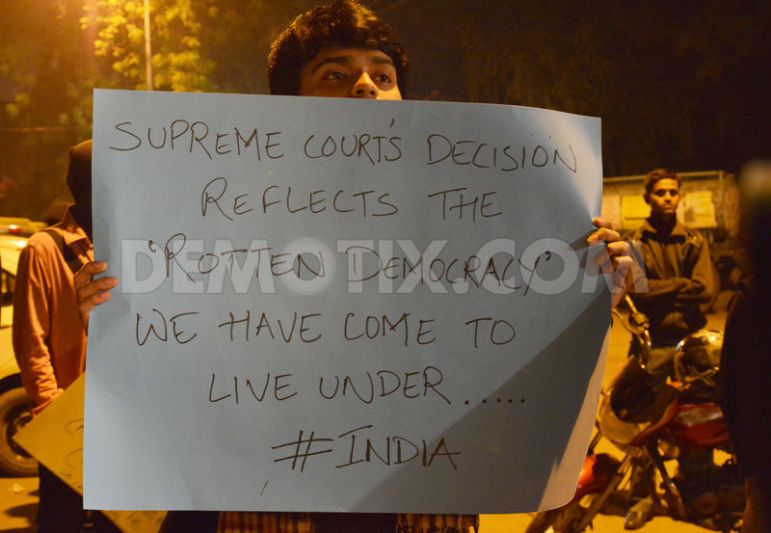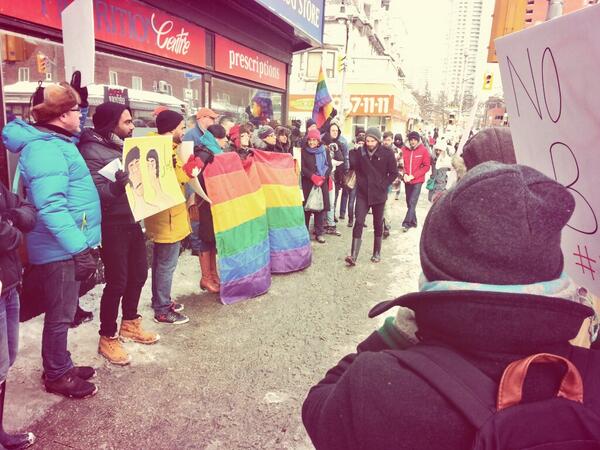By: Ashley M.
In a landmark 2009 ruling, the Delhi High Court concluded that Section 377 of the Indian Penal Code and other legal prohibitions against private, adult, consensual and non-commercial same-sex conduct, were a violation of fundamental rights enshrined in the Indian Constitution. On December 11, 2013, however, the Indian Supreme Courts revoked this ruling and reinstated the colonial-era Section 377, thereby re-criminalizing consensual gay sex and making it punishable, even by life imprisonment.
In the days following the Supreme Court ruling, a global response for December 15, 2013 was called under the banner of a “Global Day of Rage.” Around the world and in India, rallies, protests and petitions showed the tremendous support for India’s LGBTQ Community and for striking down Section 377.
“The Delhi High Court judgment was the result of at least three decades of mobilization with and beyond the law,” said Ponni Arasu , an activist and speaker at the Global Day of Rage event, held in the heart of Toronto on December 15, 2013. “A set of visionary judges decided not only to uphold the basic tenets of the constitution that they trust so deeply but also to fulfill what they saw as their duty as ethical, honest upholders of the law.
“We not only got decriminalized, but our constitutional rights as citizens to freedom of life, liberty, dignity and privacy were affirmed…. I hope all of you in Canada and elsewhere can derive strength from this movement in India while we all get through this sad moment together. And rest assured they will not get away with it.”
On December 20, 2013, India’s Central Government filed a review petition that rejects the Supreme Court’s ruling and proposes an open court hearing on gay rights. “The Govt has filed the review petition on #377 in the Supreme Court today. Let’s hope the right to personal choices is preserved,” Law Minister Kapil Sibal tweeted.
The Indian Government’s petition is certainly a response to the uproar and inspirational mobilization from people in India and around the world. However a tug-of-war has developed between the government and the courts, with the judiciary questioning the parliament’s inaction prior to the High Court’s ruling. The Indian Constitution came into effect in 1950, and hence there was plenty of time for the government to amend the law.
The Supreme Court ruling says that the 2009 High Court ruling did not make Section 377 invalid, as the matter of removing Section 377 should be through the parliament and not judiciary. Home Minister Sushilkumar Shinde was quoted by several news outlets as saying, “The legislation will take time since there is no consensus” among lawmakers.
Although the government’s apparent support for striking down Section 377 is good news, it is important to keep in mind where the government’s interests really lie. The Central Government should have started the process of changing the law after the High Court’s ruling in 2009. Their petition to the Supreme Court is merely a reaction to the large mobilization of people against the restrictive law.
As of January 28, 2013, the Supreme Court has denied the petition filed by eight parties including the Union of India, parents of LGBTQ persons, Voices Against 377, teachers, mental health professionals, Shyam Benegal and the Naz Foundation. NDTV news reports “The union government has two options: it can either file a curative petition in the Supreme Court, or it can try to amend the law in Parliament. A curative petition, the final appeal in the legal process, is heard by the Supreme Court’s senior-most judges including the Chief Justice of the country.”
Organizations, in fact, continue to organize forums and panels to strategize next steps. A protest was organized by the Queer community via facebook, January 28, to demonstrate that these refusals are temporary and the community will continue to fight. This, in fact, has given them more initiative and faith. NO GOING BACK. Stay tuned for updates facebook and Orinam .

A protester holds placard at Jantar Mantar in Delhi, January 28, 2014. Photo credit: Rohit Gautum of Demotix
Comments
